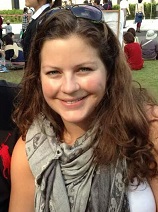Jenny Mortimer, JBEI’s Director of Plant Systems Biology and Karen Davies, staff scientist in the Berkeley Lab’s Molecular Biophysics & Integrated Bioimaging Division were two of 50 extraordinary scientists under the age of 40 who were selected to participate alongside business and political leaders in the World Economic Forum’s 2016 Annual Meeting of the New Champions, which took place from June 26-28 in Tianjin, China.
Established in 2007 as the foremost global gathering on science, technology and innovation, the meeting convenes the next generation of fast-growing enterprises shaping the future of business and society, and leaders from major multinationals as well as government, media, academia and civil society.
Scientists are chosen from all regions of the world and represent a wide range of disciplines so they can contribute their scientific perspective and deliver the most up-to-date trends from their fields. Davies and Mortimer – both originally from the United Kingdom – were chosen for this prestigious honor because they exhibit exceptional creativity, thought leadership and high growth potential in their work. As young scientists, they have demonstrated commitment to public service and actively play a transformational role in integrating scientific knowledge into society for the public good.
To learn more about their experience joining a community of more than 1500 meeting participants from 90 countries, we asked them to answer a few questions about their participation and to shed some light on what is said to be “a true global experience addressing today’s unprecedented set of intertwined global challenges – economic, political, societal and environmental.”
Davies and Mortimer agreed that the most impressive thing they saw or heard on their trip to China was Google Earth’s presentation of satellite imagery over the past 20 years, highlighting changes to the world’s vegetation in relation to global warming and world policies. “Government and state polices have a direct and profound influence on people’s actions and the current state of the earth,” Davies concluded. In addition, Mortimer was “hugely inspired” by a presentation from NASA’s Dava Newman about their plans for sending humans to the surface of Mars. “Her incredible enthusiasm and knowledge made an idea that sounded to my ears very ‘sci-fi’ seem real,” she explained. “It really got me thinking about how the technologies we’re developing at JBEI now (engineering biology to produce fuels, materials and chemicals) could play a role far beyond our current goals of sustainable bioenergy production in the US.”
Asked how the experience will influence her global outlook, Mortimer thought that “the availability and relatively low-cost mobile technologies globally, combined with big data, is producing some really interesting opportunities for entrepreneurship and international collaborations.” She added, “As a plant biologist, I see the principles of synthetic biology really opening up possibilities for global partnerships, for example with agricultural researchers in developing countries, to tackle issues affecting us all, such as drought and soil health.”
Davies reflected, “A single invention, discovery or revolutionary business practice can have profound effects on the world economy. What appears to be a simple step forward can drastically upset the status quo and trigger large-scale economical and social changes including mass unemployment.” She continued, “Technologies that are predicted to have similar or far reaching economical and social implications in the near future include BLOCKCHAIN – a new algorithm for transferring money between countries, and CRISPR.”
When asked what the one thing was they would want everyone to know about the global economy and the role scientists and technology will play, Mortimer and Davies responded seeing an important, positive role for each. Mortimer said, “A lot of scientists bemoan the lack of science-based policy decision making in government.” However, she added, “This won’t change unless we as scientists take the time to communicate what we’re doing in many different forums. People who are making these decisions are (on the whole) genuinely interested, and know that science and technology are critical to our future. But they may not have the time or knowledge to delve into the details– it’s our responsibility to present that information in an accessible and responsible way.”
“World leaders are very keen to hear and keep up-to-date with, or even stay ahead of, the latest scientific developments,” Davies agrees. “The main reason for this is to make sure policies and procedures are in place to cope with the revolutionary powers and effects of many scientific discoveries. The Annual Meeting of the New Champions provides an important platform where scientists present their latest finding to an audience of world leaders.”

